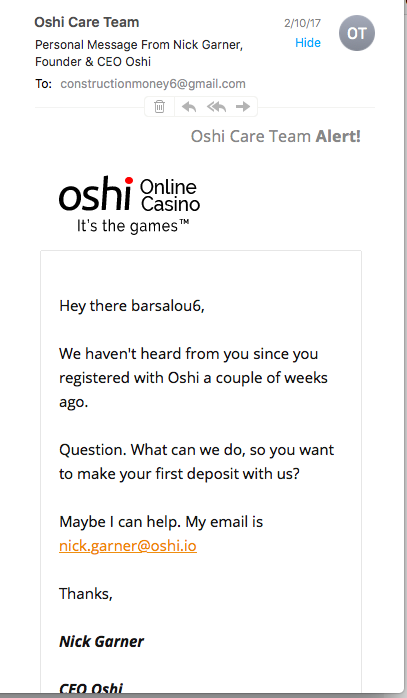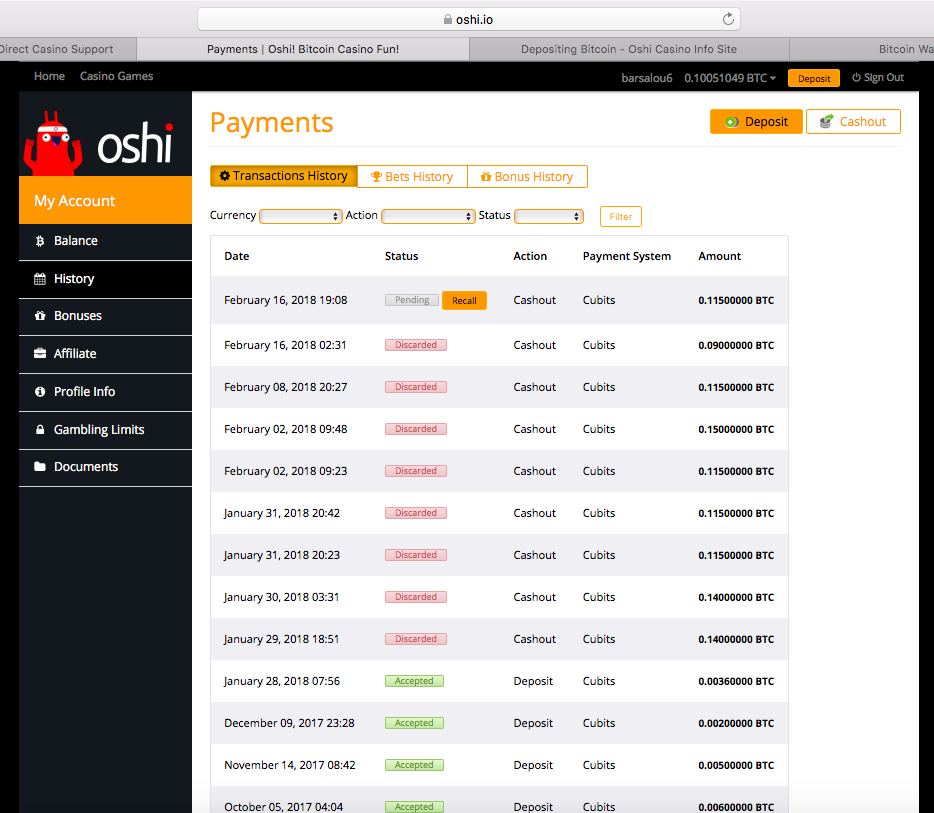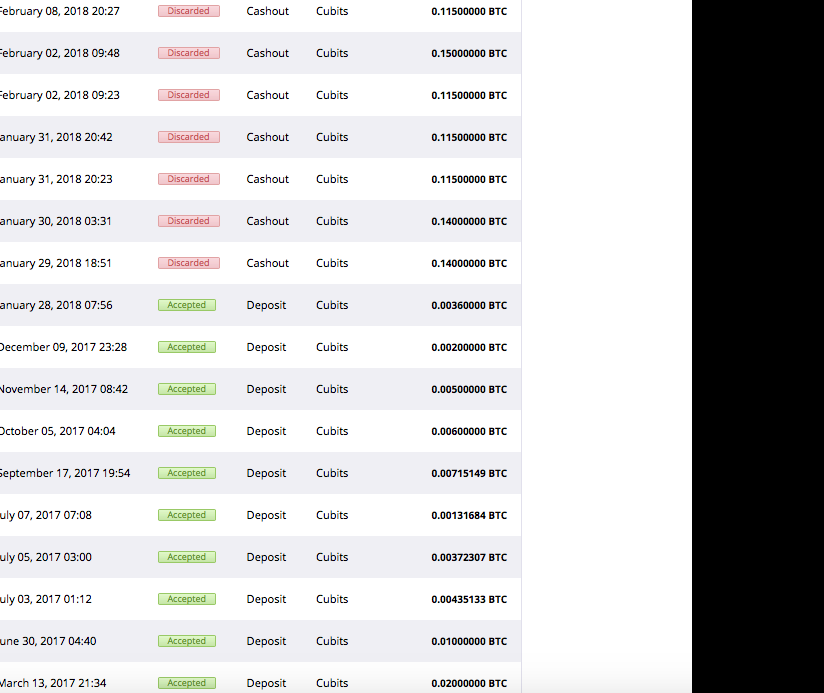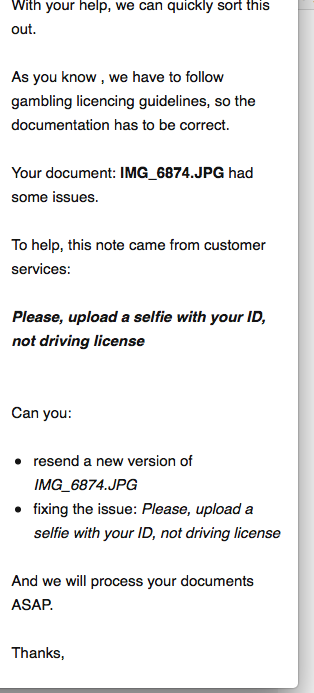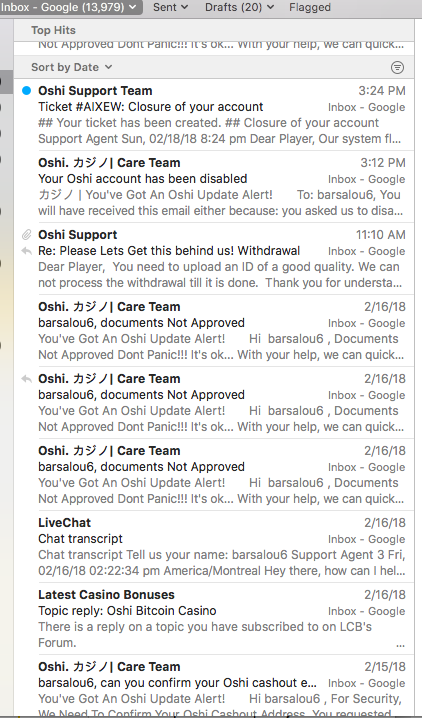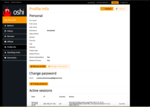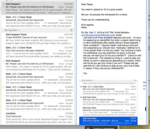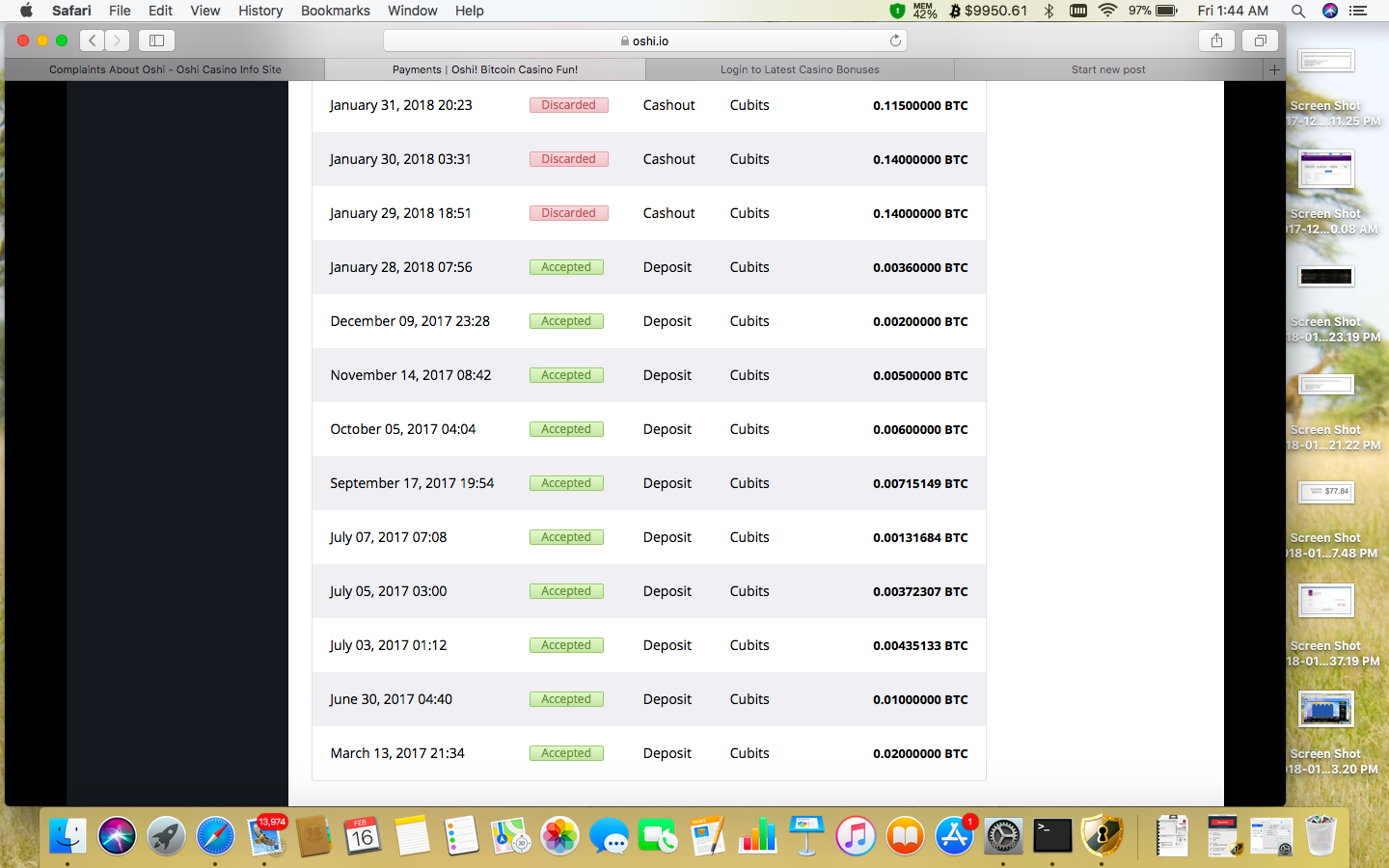Hi, I have reviewed this case in some detail
Firstly I'll go through some of the higher-level issues relating to this case and then I get into the specifics.
High-level issues:
- bonus abuse and duplicate accounts
- anti-money laundering legislation
- people knowingly gambling on Oshi even though they come from jurisdictions we can't accept customers from
- withdrawals and when ID checks get triggered
Bonus abuse
When you incentivise people to abuse the system, they will. At Oshi, we are very generous of bonuses, which is always given us trouble. The largest bonus we do as 180% match bonus and we offer daily reload bonuses.
Upshot of giving away lots of money: we get a huge number of people setting up duplicate accounts and using our bonuses across these. Reason; the more separate accounts you have, the more bonus money you can use and the more likelihood there is of winning big.
So we are constantly trawling through our system identifying people who have got duplicate accounts and who have run through their bonuses.
Just to confuse things slightly, it's okay to have duplicate accounts... As long as you only use bonuses on one of them. In our terms and conditions, duplicate accounts are one of the most prominent issues we talk about.
Gambling from jurisdictions we can't accept customers from.
Since we use a Curaçao licence, we are able to accept customers from any jurisdiction that does not exclude us. For example we can't accept customers from the UK, United States, many European countries. If somebody logs on to Oshi from one of these territories, they won't be able to access the casino games. Upshot: it's pretty obvious if you're from a jurisdiction that we can't accept customers from.
As long as we take sensible precautions to make it clear to customers that we can't accept people from certain jurisdictions, then we are fulfilling the terms of our Curaçao licence and not contravening licensing from other jurisdictions.
Anti-money laundering legislation
in the world of online gambling, there are two regulatory ecosystems we have to deal with:
- gambling legislation, which is to do with which countries we can accept customers from
- anti-money laundering legislation, which is to do with antiterrorism, crime and so on
Anti-money laundering is on another level of severity. Simply, casinos are a very good way to launder money. Here's just one article amongst thousands about it http://vancouversun.com/news/national/exclusive-how-b-c-casinos-are-used-to-launder-millions-in-drug-cash
Casinos get a lot of attention from authorities from multiple jurisdictions... Bitcoin casinos... get even more attention because of the pseudo-anonymity of Bitcoin. This is why we take anti-money laundering very seriously.
Paying in - You hear a lot of out people complaining that we didn't do a KYC check on payments in. If it is a substantial payment in, then we will do a check. But typically we find people pay in small amounts of money over a long period of time and these remain under the KYC thresholds.
Cashing out - when people have a big win, oftentimes that's when they want to cash out above our KYC thresholds. If we find they have got duplicate accounts or come from jurisdiction we can't accept them from then we will withhold winnings and depending on the case, most often return their previous deposit as a small gesture of goodwill.
If you check us out on the Internet, lots of people say the same thing about us: we cashout fast, because it's important to people. But then you have a case like this...
The case in hand
- this person had three different accounts, on the two other accounts he had, he used no deposit free spins
- the ID he presented didn't look like him
- the ID card itself had been tampered with and had various identifiers 'whited out'
- He tried to withdraw equivalent of €1234 (random number I know) , which is approximately €250 above our 'ID check' threshold. - If this person had withdrawn in smaller amounts, we may never have flagged him up.
- Between July and now, his average deposit size was euro equivalent of €41 (I've based this on today's exchange rate, so it's not that accurate) , explaining why we didn't ID check him on his deposits.
As a reader, what do you learn?
We have to walk on a tightrope between
- keeping anti-money laundering gambling legislation authorities happy,
- dealing with customers who are trying to
leverage the fact we actually care about our reputation to make claims like the one you seen
- not get completely cleaned out by bonus abusers
- make a profit somewhere so we can carry on in business.
Finally
With Bitcoin, customers have a degree of anonymity, which means it's very hard for us to work out who they are and where they're from. As long as we have acceptable cash out thresholds before we make a check, then the authorities will hopefully not give us a hard time. In my view, with this claimant, he is just trying to force us into paying money is not due to him.
I hope this is helpful
Nick
Founder Oshi
Hallo, ik heb deze zaak tot in detail bekeken
Eerst zal ik enkele kwesties op een hoger niveau met betrekking tot deze zaak doornemen en daarna ingaan op de details.
Problemen op hoog niveau:
- bonusmisbruik en dubbele accounts
- antiwitwaswetgeving
- mensen die willens en wetens gokken op Oshi, ook al komen ze uit rechtsgebieden waar we geen klanten kunnen accepteren
- opnames en wanneer ID-controles worden geactiveerd
Bonusmisbruik
Als je mensen ertoe aanzet het systeem te misbruiken, zullen ze dat ook doen. Bij Oshi zijn we erg gul met bonussen, wat ons altijd problemen bezorgt. De grootste bonus bieden we als 180% matchbonus en we bieden dagelijkse herlaadbonussen.
Resultaat van het weggeven van veel geld: we krijgen een groot aantal mensen zover dat ze dubbele accounts opzetten en onze bonussen hierop gebruiken. Reden; hoe meer afzonderlijke accounts je hebt, hoe meer bonusgeld je kunt gebruiken en hoe groter de kans is dat je veel wint.
We doorzoeken dus voortdurend ons systeem om mensen te identificeren die dubbele accounts hebben en hun bonussen hebben opgebruikt.
Om de zaken een beetje te verwarren: het is prima om dubbele accounts te hebben... Zolang je maar op één account bonussen gebruikt. In onze algemene voorwaarden zijn dubbele accounts een van de meest prominente problemen waar we het over hebben.
Gokken in rechtsgebieden waar we geen klanten kunnen accepteren.
Omdat we een Curaçaose licentie gebruiken, kunnen we klanten accepteren uit elk rechtsgebied dat ons niet uitsluit. We kunnen bijvoorbeeld geen klanten accepteren uit Groot-Brittannië, de Verenigde Staten en veel Europese landen. Als iemand vanuit een van deze gebieden inlogt op Oshi, heeft hij of zij geen toegang tot de casinospellen. Conclusie: het is vrij duidelijk als u uit een rechtsgebied komt waar we geen klanten kunnen accepteren.
Zolang we verstandige voorzorgsmaatregelen nemen om klanten duidelijk te maken dat we geen mensen uit bepaalde rechtsgebieden kunnen accepteren, voldoen we aan de voorwaarden van onze Curaçaose licentie en overtreden we de licenties van andere rechtsgebieden niet.
Anti-witwaswetgeving
in de wereld van online gokken zijn er twee regulerende ecosystemen waarmee we te maken hebben:
- kansspelwetgeving, die te maken heeft met welke landen wij klanten mogen accepteren
- antiwitwaswetgeving, die te maken heeft met antiterrorisme, misdaad enzovoort
De strijd tegen het witwassen van geld is van een ander niveau. Casino’s zijn eenvoudigweg een zeer goede manier om geld wit te wassen. Hier is slechts één artikel uit duizenden erover http://vancouversun.com/news/national/exclusive-how-bc-casinos-are-used-to-launder-millions-in-drug-cash
Casino's krijgen veel aandacht van autoriteiten uit meerdere rechtsgebieden... Bitcoin-casino's... krijgen nog meer aandacht vanwege de pseudo-anonimiteit van Bitcoin. Daarom nemen wij de bestrijding van het witwassen van geld zeer serieus.
Betalen - U hoort veel mensen klagen dat we geen KYC-controle hebben uitgevoerd op de binnenkomende betalingen. Als het om een substantiële binnenkomende betaling gaat, zullen we een controle uitvoeren. Maar meestal zien we dat mensen gedurende een lange periode kleine bedragen betalen en dat deze onder de KYC-drempels blijven.
Uitbetalen - wanneer mensen een grote winst behalen, willen ze vaak uitbetalen boven onze KYC-drempels. Als we ontdekken dat ze dubbele accounts hebben of afkomstig zijn uit een rechtsgebied waar we ze niet kunnen accepteren, zullen we de winst inhouden en, afhankelijk van het geval, meestal hun eerdere storting teruggeven als een klein gebaar van goede wil.
Als je ons op internet bekijkt, zeggen veel mensen hetzelfde over ons: we betalen snel uit, omdat het belangrijk is voor mensen. Maar dan heb je zo'n geval...
De zaak in handen
- deze persoon had drie verschillende accounts, op de twee andere accounts die hij had, gebruikte hij gratis spins zonder storting
- het identiteitsbewijs dat hij presenteerde leek niet op hem
- er was met de identiteitskaart zelf geknoeid en er waren verschillende identificatiegegevens 'witgemaakt'
- Hij probeerde het equivalent van €1234 (willekeurig getal dat ik weet) op te nemen, wat ongeveer €250 boven onze 'ID-controle'-drempel ligt. - Als deze persoon kleinere bedragen had opgenomen, hadden we hem misschien nooit gewaarschuwd.
- Tussen juli en nu was zijn gemiddelde stortingsbedrag € 41,- (ik heb dit gebaseerd op de wisselkoers van vandaag, dus het is niet zo nauwkeurig), wat verklaart waarom we hem niet hebben gecontroleerd op zijn stortingen.
Wat leer je als lezer?
Daartussen moeten we op een koord lopen
- de antiwitwaswetgevingsautoriteiten tevreden houden,
- omgaan met klanten die dat proberen
Maak gebruik van het feit dat we echt om onze reputatie geven, om beweringen te doen zoals u die heeft gezien
- niet volledig worden opgeruimd door bonusmisbruikers
- ergens winst maken, zodat we door kunnen gaan met ondernemen.
Eindelijk
Met Bitcoin hebben klanten een zekere mate van anonimiteit, wat betekent dat het voor ons erg moeilijk is om erachter te komen wie ze zijn en waar ze vandaan komen. Zolang we acceptabele uitbetalingsdrempels hebben voordat we een cheque uitvoeren, zullen de autoriteiten het ons hopelijk niet moeilijk maken. Naar mijn mening probeert hij ons met deze eiser alleen maar te dwingen geld te betalen dat niet aan hem toekomt.
Ik hoop dat dit nuttig is
Nick
Oprichter Oshi
